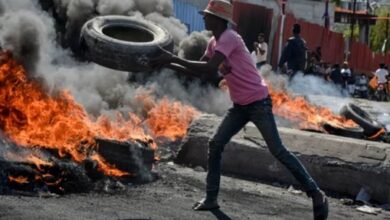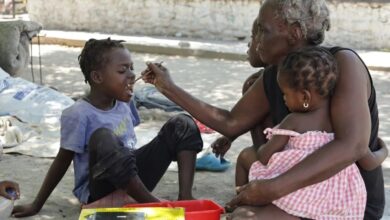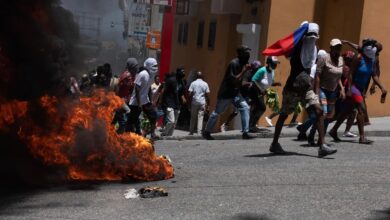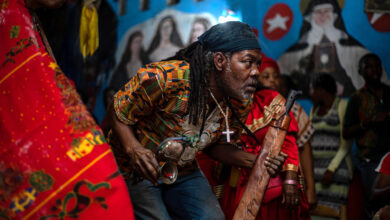Haiti’s CARDH: Forced to Pause Amid Escalating Gang Violence
The Center for Human Rights Analysis and Research (CARDH) in Haiti has temporarily suspended its operations due to growing threats to its staff amidst escalating gang violence in Port-au-Prince.

11/16/2023.- An employee shows bullet casings at the door of the hospital in the populous neighborhood of Cité-Soleil, a sector marked by new clashes between groups fighting to conquer new neighborhoods, in Port-au-Prince (Haiti) . EFE/ Johnson Sabin
The Latin American Post Staff
Escucha este artículo
Leer en español: El CARDH de Haití: obligado a hacer una pausa en medio de la escalada de violencia de pandillas
Grim Warning
Haiti, a nation already grappling with numerous challenges, is facing yet another setback as the Center for Human Rights Analysis and Research (CARDH) announces the provisional suspension of its activities. The decision comes in response to the imminent danger posed to its staff by the intensifying gang warfare that has engulfed parts of the capital, Port-au-Prince.
Gedeon Jean, the executive director of CARDH, leads a team of 16 individuals dedicated to shedding light on critical human rights issues in Haiti. He revealed that a co-worker who had been abducted on October 29 and subsequently freed on November 17 had issued a dire warning. The kidnappers who had targeted him had explicitly conveyed their intention to target the organization itself. Jean emphasized that CARDH's work had been perceived as "disturbing" by specific sectors in Haiti.
"He confirmed the kidnappers are directly targeting me," Jean stated.
Unveiling the Web: CARDH's Mission to Expose Crime, Politics, and Economy Connections
The heart of CARDH's mission lies in its reports and analyses, which expose the intricate web of connections between crime, politics, and the economy in Haiti. Their work has cast a revealing spotlight on the actual power players in the criminal industry, who often elude identification as mere gang leaders.
The international community has taken note of this web of influence. The United States and Canada have imposed sanctions on several politicians and business people in Haiti, accusing them of providing financial support to these criminal gangs.
CARDH's publications have delved into the harsh living conditions faced by those displaced by gang warfare, the brutal lynching of suspected gang members by vigilante groups known as "Bwa Kale," the killings of police officers, and assessments of foreign sanctions.
Disturbing Numbers: CARDH Documents Soaring Kidnappings and Murders
One particularly troubling aspect highlighted by CARDH is the alarming rise of what they term a kidnapping "industry." Gangs resort to extreme violence and torture to extract hefty ransoms from the families of their victims. In the period up to September this year, CARDH documented a staggering 901 kidnappings, alongside 1,564 murders. There has also been a surge in mass kidnappings in the Bas-Artibonite region north of the capital, which the organization warns could potentially evolve into a significant gang stronghold unless effective countermeasures are swiftly implemented.
As violence continues to spiral out of control, the recent killing of a prominent gang leader triggered a fresh wave of unrest in Cite Soleil. According to the United Nations, over 146,500 people have been displaced in the West Department alone, with the majority seeking refuge in the capital's metropolitan area.
Scaling Down Operations: CARDH Temporarily Halts Activities Amidst Threats
In a statement issued on Wednesday, CARDH revealed that it had been gradually scaling down its activities over the past few months. Now, with the threats they had anticipated becoming a grim reality, the organization has temporarily put its operations on hold. CARDH is waiting for protective measures to be implemented to ensure the safety of its team so that they can continue their critical work in the field of human rights in Haiti.
Also read: Colombia's Keeps Battling Cocaine Production Amid Fentanyl Growth
As Haiti grapples with this suspension of CARDH's work, the nation faces a stark reminder of its challenges to restore peace, security, and stability. The plight of its citizens remains in the balance, and the international community is called upon to support efforts to address the multifaceted crisis plaguing this resilient country.





